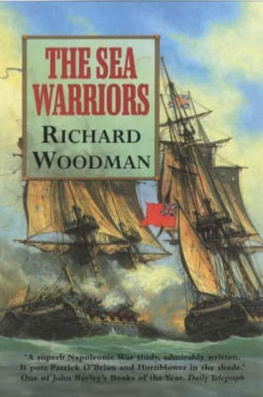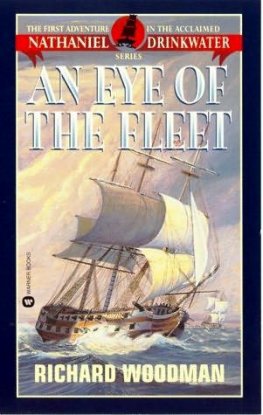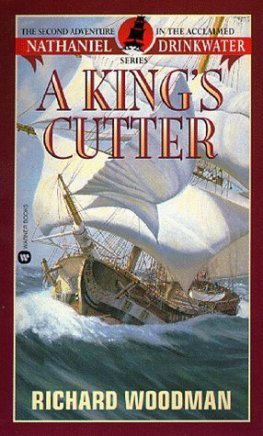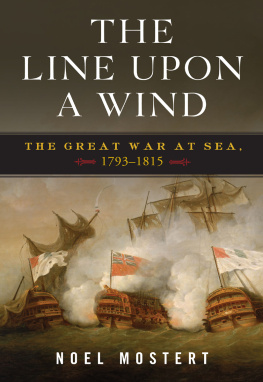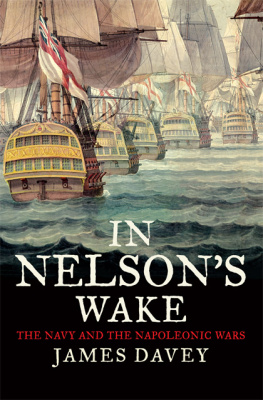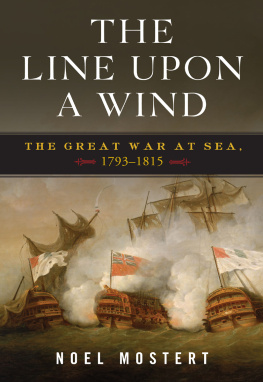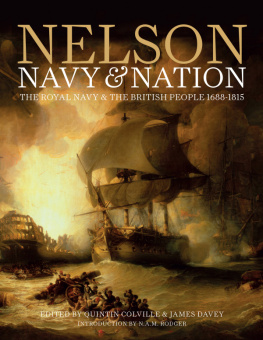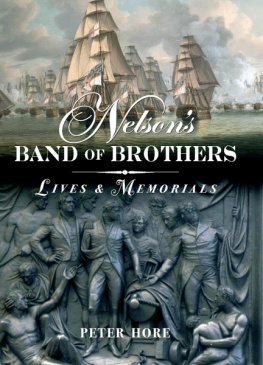RICHARD WOODMAN is best known for his Nathaniel Drinkwater series of historical naval novels. He has also written a dozen other sea stories and several histories, including acclaimed studies of Arctic and Malta convoys during the Second World War.
Born in London in 1944, Richard Woodman joined his first ship at the age of 16 and spent over thirty years at sea. He has had extensive experience of command and operational planning, is a keen yachtsman and has sailed in square-rig. Married with two adult children, he now writes full time and is a regular contributor to Lloyds List.
Praise for The Sea Warriors
A marvellous book... which shows where Patrick OBrian and C. S. Forester got all their stuff from, but is more exciting to read than either.
John Bayley, Times Literary Supplement
Opens the door on a hitherto neglected part of this countrys great naval history.
Contemporary Review
An eminently readable popular history... The subjects covered are indeed vast, and Richard Woodman does well to pack a great deal of information into the pages of this work without once writing a dull sentence.
Charles Stephenson, Osprey Military Journal
This is an excellent operational history of the Royal Navys frigates in the old wars which will enhance Captain Woodmans reputation and will make good reading by the winter fireside.
Lawrence Phillips, Ships Telegraph
A feast for the imagination... the action is breathless, fearsome, spectacular.
Max Sarche, Model Boats magazine
By the same author
Fiction:
The Nathaniel Drinkwater Series:
An Eye of the Fleet
A Kings Cutter
A Brig of War
The Bomb Vessel
The Corvette
1805
Baltic Mission
In Distant Waters
A Private Revenge
Under False Colours
The Flying Squadron
Beneath the Aurora
The Shadow of the Eagle
Ebb Tide
Other novels:
Wager
Endangered Species
The Darkening Sea
Voyage East
The Accident
Act of Terror
Waterfront
Under Sail
The Guineaman
The Privateersman
The Captain of the Carryatid
The Cruise of the Commissioner
Non-Fiction:
The History of the Ship
The Story of Sail
The Victory of Seapower, 180614
Arctic Convoys, 194145
Malta Convoys, 194042
Keepers of the Sea
View from the Sea
THE SEA WARRIORS
Fighting Captains and Frigate Warfare in the Age of Nelson
RICHARD WOODMAN
ROBINSON
London
Constable & Robinson Ltd
5556 Russell Square
London WC1B 4HP
www.constablerobinson.com
First published in the UK by Constable,
an imprint of Constable & Robinson Ltd, 2001
Copyright Richard Woodman 2001
The right of Richard Woodman to be identified as the author of this work has been asserted by him in accordance with the Copyright, Designs and Patents Act, 1988
All rights reserved. This book is sold subject to the condition that it shall not, by way of trade or otherwise, be lent, re-sold, hired out or otherwise circulated in any form of binding or cover other than that in which it is published and without a similar condition including this condition being imposed on the subsequent purchaser.
A copy of the British Library Cataloguing in Publication Data is available from the British Library
ISBN 1-84119-598-7
eISBN 978-1-78033-924-5
Printed and bound in the EU
10 9 8 7 6 5 4 3 2
Contents
Acknowledgements
I wish to express my gratitude to David Blomfield for his kindness in reading the typescript and suggesting a number of important structural changes; to Liz Robinson for her consummate skill as an editor; to Jan Chamier for suggesting the concept, and to Tom Pocock for suggesting the author! Thanks also to Krystyna Green for her assiduous attention to all the manifold details of book production, to Max Burnell, John Groves and John Dunne for the cover, to Douglas Matthews for the index and to Tony Fernandes for his splendid drawing of the Seahorse. The debt I owe to my wife Chris remains enormous.
Richard Woodman
Illustrations
Maps
Plates
Foreword
The British Royal Navy during the Age of Nelson has proved rich in inspiration for novelists ranging from Captains Marryat and Chamier, John Davies and the mysterious Bill Truck, all of whom served at sea at the time, to C.S. Forester, Alexander Kent, Dudley Pope and Patrick OBrian.
My own fascination began when, at the age of fourteen, I acquired six broken-backed volumes of William Jamess The Naval History of Great Britain from a jumble sale. They cost me my weeks pocket money, the princely sum of half a crown, some twelve and a half pence. What added to my sense of excitement as I returned home with my purchase was the discovery that Jamess pages were uncut. I had the illusion that I was the first person to read the books.
I became fascinated by the skills and intricacies of manoeuvring ships under sail, fascinated too by the men who handled them. I also sought experience under sail myself, though I was to earn my living in more prosaically-propelled vessels. Years later, at sea in my own first command, I embarked in recording the adventures of Nathaniel Drinkwater, whose naval service is exclusively in what were then generically referred to as cruizers. Notwithstanding the invention a novelist may resort to, the truth remains for me more remarkable than fiction, precisely because the pages of William James convinced me that the reality had been truly amazing.
This, then, is the story of these men, the real Hornblowers, Aubreys, Bolithos, Ramages and Drinkwaters. Many enjoyed lives as fantastical as their literary successors, many deserve hauling out from under the shadow of the great Nelson, while the character of most of them, one way or another, provides the answer to the question why, despite all its horrors and hardships, the British Royal Navy kept the sea and fought so magnificently for almost a quarter of a century.
Though it is set against the background of grand strategy, this book is not the history of admirals and fleets, for that would be an overview inimical to its purpose. Here the viewpoint is more intimate; here, I hope, are glimpses of men upon their own quarterdecks in pursuit of enemy men-of-war, in defence of convoys, or escaping from superior forces. Here may be found accounts of attacks on shore positions, ports, batteries and other military targets, as well as on enemy merchant shipping; in fact, on all the objectives damaging to an enemy. Nevertheless, the book only skims the surface. William Jamess
Next page
